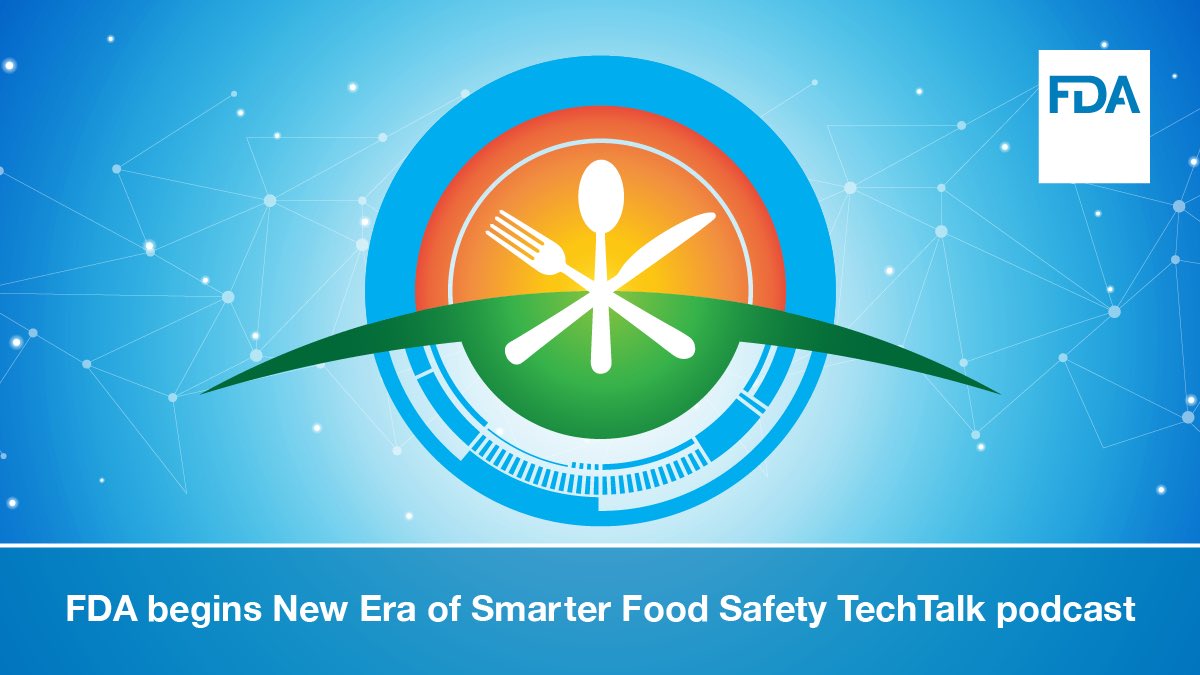
The third installment of FDA’s new podcast series on technology and food safety focused on AI (artificial intelligence) and its potential to advance food safety. It was hosted by Frank Yiannis, Deputy FDA Commissioner for Food Policy and Response and Donald Prater, Associate Commissioner for Imported Food Safety.
The experts were Maria Velissarou, Global Corporate Research & Development VP and Chief Science Officer for Mars Incorporated, Nikos Manouselis, founder and CEO of Agroknow, a food safety intelligence company and Cronan McNamara, founder and CEO of Crème Global, a company providing food safety data analytics and predictive modeling software and services.
In the FDA’s New Era of Smarter Food Safety Blueprint, the second Core Element called “Smarter Tools an Approaches for Prevention and Outbreak Response” includes goals to expand predictive analytics capabilities using AI and machine learning tools. In this podcast, a discussion took place with the above food industry experts about opportunities that artificial intelligence offers to help protect consumers from food safety problems as well as the potential uses for AI that food producers might consider.
Yannis sees “the use of AI as an absolute game-changer, a powerful new tool that we can add to our food safety toolbox, one that could significantly enhance our ability to create a safer food system.”
Donald Prater, on the imported food side, mentioned that in 2019 imported shipments included 32% of our fresh vegetables, 55% of our fresh fruit and more than 90% of seafood. In this podcast he talks more about some areas that FDA is considering on import screening using AI and machine learning. He goes into detail about the FDA’s AI seafood pilot and how machine learning could increase the ability and likelihood of identifying a shipment of seafood that could potentially be contaminated.
Maria Velissarou from Mars Inc. explained that “AI is becoming increasingly embedded in the end-to-end supply chains in agriculture and food. It gives us algorithms that, when combined with conventional technique like forecasting, can sharpen and expedite foresights and insights. And AI-powered Internet of Things (IoT) can improve efficiencies, detect defective or unsafe ingredients in food processing, and ensure that food safety protocols are adhered to n compliance with regulations.” She discussed AI-based horizon scanning and aflatoxin prediction.
Nikos Manouselis of Agroknow sited the example from the area of horizon scanning as it applies to food safety incidents – but not the ones being reported by major agencies like the FDA or RASFF, but rather from small authorities from local municipalities in various languages or dialects. He mentions using web crawling software systems that employ AI in different steps of the process to discover and incorporate data from this unstructured smaller data source. One of the main benefits of using this type of AI s not only better information but how quickly the data can be assimilated.
Cronan McNamara of Crème Global described his involvement with Western Growers Food Safety Data Sharing Project and the collection of data and pilot program with leafy green growers in the California and Arizona Regions. “Dashboards were created where the growers can come and visualize what’s going on with their data at and aggregated and anonymized level. Information was collected on inspections, product testing, water testing and location and then combined with info from weather, topology, and dates. We’re training up a machine learning tool to uncover risks and trends that may not be apparent to the human eye, even when you’re visualizing these datasets.”
This is just a brief recap of some of the issues discussed in this podcast – there is much more to learn and enjoy. We consider this podcast well-worth listening to.
To access this podcast, click here.
If you missed the first two podcasts in this series, they are available as follows:
- TechTalk Podcast Episode 1: Tech-enabled Traceability in the New Era of Smarter Food Safety
- TechTalk Podcast Episode 2: Whole Genome Sequencing in the New Era of Smarter Food Safety
技術と食品安全性をテーマに米国食品医薬品局(FDA)が提供している新しいポッドキャストシリーズの第3回では、人工知能(AI)が食品安全性をどのように進歩させられるかに焦点を当てました。ポッドキャストの主催者は、FDAの副委員長で食品政策と対策を担当するFrank Yiannis氏、および委員長補佐で輸入食品の安全性を担当するDonald Prater氏です。
この回に出演した専門家は、食品メーカーMarsのグローバルコーポレート研究開発担当副社長兼最高研究責任者、Maria Velissarou氏、食品安全性情報を提供するAgroknowの設立者兼CEO、Nikos Manouselis氏、食品安全性のデータ分析と予測モデリングのソフトウェアおよびサービスを提供するCrème Globalの設立者兼CEO、Cronan McNamara氏でした。
FDAの「スマートな食品安全性の新時代ブループリント」では、「食中毒の予防と対応のためのスマートなツールとアプローチ」がコア要素の2点目に掲げられています。これには、AIや機械学習のツールを使って予測分析能力を拡大するといった目標が含まれています。今回のポッドキャストでは、出演した専門家が、食品安全性の問題から消費者を保護するためにAIがどのように役立つか、また食品生産者にとってどのようなAIの使い方が考えられるかを話し合いました。
Yannis氏は、AIが「業界を抜本的に変化させる強力なツール」だと考えていて、「食品安全性の手段のひとつとしてAIを追加することで、より安全な食品供給体制を構築するための私たちの能力が大幅に高まる」としています。
また、輸入食品を担当するDonald Prater氏は、2019年の時点で米国の生鮮野菜の32%、生鮮果物の55%、魚介類の90%以上が輸入品だったと説明しました。そして、FDAがAIと機械学習を活用した検査体制の導入を検討している領域について、踏み込んで説明しました。それによると、FDAは魚介類を対象としたAIの試験運用を進めつつあり、機械学習を使うことで、輸入される魚介類に含まれる汚染の可能性を特定する能力と確率を高められるとのことでした。
MarsのMaria Velissarou氏は、次のように語りました。「農業と食品のサプライチェーン全体にAIがますます組み込まれるようになっています。このアルゴリズムを予測などの従来の技法と組み合わせることで、展望や洞察を明敏化・迅速化することができます。また、AIを搭載したモノのインターネット(IoT)は、効率を改善し、食品加工の工程で不良品や安全でない原材料を検出し、さらには食品安全性の手順に従って規制を順守していることを確認できるようにします」。Velissarou氏は、AIを活用したホライズンスキャニングやアフラトキシンの予測についても言及しました。
さらに、AgroknowのNikos Manouselis氏は、食品安全性の問題に関係したホライズンスキャニングの例を紹介しました。FDAや欧州の食品・飼料早期警告システム(RASFF)のように著名な機関の報告する問題ではなく、各地の自治体の当局によってさまざまな言語と方言で報告された問題を対象としたものです。ウェブをクローリングするソフトウェアが、プロセスの諸段階でAIを使用して、この種の小規模なデータソースの構造化されていないデータを発見し、統合できるのだそうです。このようなAIを使う大きなメリットのひとつが、情報の質を高められるだけでなく、データをすばやく消化できるようになることです。
Crème GlobalのCronan McNamara氏は、米国西部の生産者が結成している食品安全性データ共有プロジェクトへの関与について説明し、特にカリフォルニア州とアリゾナ州の緑葉野菜の生産者と進めているデータ収集と試験運用について話しました。「集計済みの匿名化されたデータを生産者が一緒に見て、何が起こっているかを視覚化できるダッシュボードを開発しました。検査、商品試験、水質試験、場所などに関する情報を収集したうえで、気象、地形、日付や季節などの情報と組み合わせています。機械学習のツールに学習させることで、データセットを視覚化していても人間の目には明らかに見て取れないようなリスクやトレンドを発見しようとしています」。
これらは、今回のポッドキャストで話題に上がった点の簡単な抜粋にすぎません。ほかにも楽しくてためになる情報が多々ありました。このポッドキャストは、聞いてみる価値があります。
ポッドキャストにアクセスするには、こちらをクリックしてください。
このポッドキャストシリーズの最初の2回を聞き逃した方は、次のリンクからアクセスできます。
